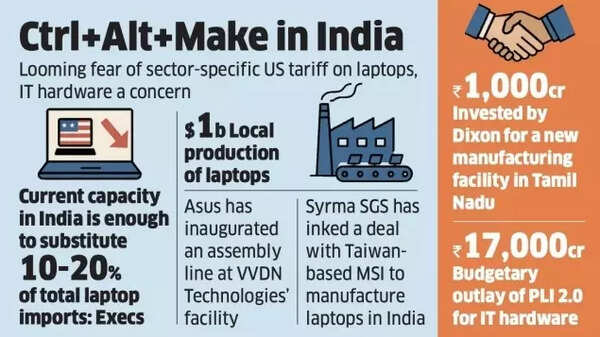Goodbye China, Namaste India! Production shift production fruits as laptop brand PLI scheme, Trump’s tariffs are large

India’s incentive program for production of Rs 17,000 crore for IT hardware has started to achieve results as several brands already on China partnership with domestic contract manufacturers for laptop production in India.
These cooperation comes against the background of increasing trade tension between China and the US. Despite the current exemption of the Donald Trump administration on IT hardware imports from China, companies are hasty for the local manufacturing system with Indian firms, inspired by concerns on the potentially field-specific tariffs that anticipated in May.
Indian manufacturers are increasing their production capabilities by offering the benefits of global brands through low tariffs and encouragement schemes. Additionally, they provide opportunities to participate in government contracts requiring 20–50% local content.
Industry sources told ET that the current manufacturing capacity in India could replace around 10–20% of the total laptop imports, reaching $ 11 billion in FY 2014. According to the current domestic laptop production industry data, it is about 1 billion dollars.

Make in india
Production Linked Incentive (PLI) 2.0 for IT hardware offered on May 29, 2023, allocates a budget of Rs 17,000 crore in six years. The program provides about 5% incentives on pure incremental sales of locally manufactured products. To secure additional incentives, manufacturers should increase the component localization per year.
The government estimates that PLI 2.0 will attract Rs 3,000 crore in investment, generates Rs 3.5 lakh crore in production price, and will generate 47,000 jobs across the country.
Asus recently launched an assembly line in VVDN Technologies’ Manesar feature after six months of discussion about scalability and localization. According to Gaub Basu, senior vice president of VVDN, who spoke to Financial Daily, his current production line produces a laptop every 240 seconds.
Also read Elon Musk’s Tesla saw India to diversify its global supply chain; In conversation with CG Semi, Micron
“Our commitment to India is very strong, very strong,” said Dinesh Sharma, Vice President, Commercial PC and Smartphone System Business Group, Asus. “When you are trying to move your production supply chain, cost efficiency is a matter of concern. And the more backward integration we can get, the better”.
Gurugram -based Sirma SGS has established an agreement with Taiwan -based MSI for laptop manufacturing in India, responding to strict import rules. As a partner in IT Hardware PLI, contract maker recognizes the opportunity for Indian companies to benefit from changes away from high-tariff countries such as China and Vietnam.
“We should hold the bull in the industry with its horns and take an opportunity to develop the ecosystem of the base of components in India,” Jasbir Singh Gujral, Managing Director, Sirma SGS said, given that the organization would consider the capacity extension to attract additional laptop brands for exports.
Dixon Technologies has allocated more than Rs 1,000 crore for setting up a new manufacturing unit in Tamil Nadu for HP Inc. laptop production. The feature prescribed to start operations in May will initially produce two million laptops annually. Additionally, Dixon has contracted with Lenovo and Asus for laptop production at this place, while already producing 25–30% of Acer’s domestic requirements in their Noida feature.
Government data indicates that by December 2024, PLI has attracted Rs 520 crore in investment, acquired Rs 10,000 crore in production price, and created 3,900 employment opportunities.
The program has experienced limited participation, as international companies benefit from China’s 4-5% manufacturing costs before tariff implementation, importing most of their Indian sales quantities. Despite China’s established cost -effective ecosystem, global companies are now actively developing a comparable infrastructure in India as an alternative manufacturing basis.
Also read Donald Trump Tariff pushed Chinese giants to bow down to India’s terms
India’s laptop exports are forced due to strict American product testing requirements. An executive said that India lacks proper testing facilities, the US export certificates require product shipment in the nearest laboratory of Shanghai, resulting in additional expenses.
Asus’s Sharma considered the company to encourage the company’s own global component suppliers to establish Indian operations, expressing their desire to share these suppliers with VVDN to support their backward integration initiative.
VVDN reported the construction of various components and modules, including Wi-Fi antennas, camera modules, memory packaging, display assembly, mechanical incidence and additional items. The company intends to set up a printed circuit board construction facility.




